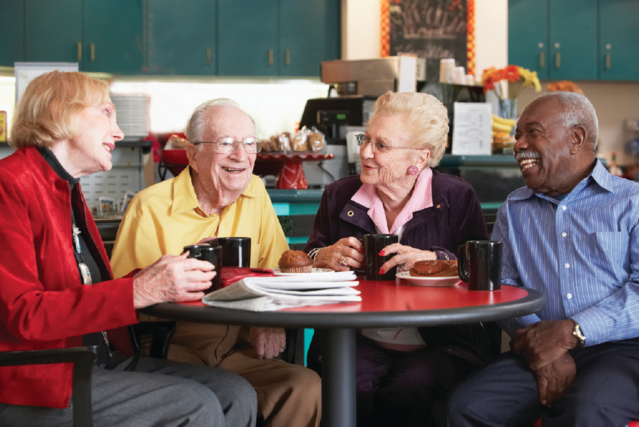
by Ronald H. Aday, Ph.D Director of Aging Studies, Middle Tennessee State University, Murfreesboro, TN
For older persons at risk of losing their self-sufficiency, senior centers are an entry point to an array of services that will assist them as they “age in place.”
Senior centers offer a wide range of health, education, recreation, volunteer and other social interaction opportunities for their participants that enhance dignity, support independence, and encourage community involvement. Centers are also a resource for the entire community, providing services and information on aging, and assisting family and friends who care for older persons.
Senior centers can optimally provide a social environment conducive to the development of a social support system reducing loneliness and depression. Although additional research is needed, we are beginning to get a clearer picture of the positive influence senior centers can have on successful aging.
A recent survey of 734 senior center participants residing in California, Florida, Iowa, Main, New Hampshire, Texas, and Tennessee produced a variety of research outcomes suggesting the important role senior centers play in the lives of older adults when it comes to their physical and mental well-being. Selected results of this survey are described below:
About 90% of seniors reported their health to be the same or better than the previous year; Almost half feel less lonely (46%), laugh more frequently (49%), have reduced their levels of stress (48%), feel more satisfied with life (43%), and have increased or started exercising regularly (40%).
About one-quarter have more energy (22%), worry less about the future (23%), and feel more independent (28%). Practicing healthy behavior was positively associated with the number of educational and health promotion programs attended. Participants who make positive behavioral changes were more likely to enjoy a more positive outlook on life.
Engaging in health promotional activities also enhances the feeling of empowerment by maintaining a more independent lifestyle. As these research findings suggest, senior centers of the 21st Century have the potential to bring together a broad and varied program of services and activities that enable older persons to develop a greater feeling of empowerment. Additional research has demonstrated that centers with structured health and wellness programs generated even greater changes in health behaviors and emotional well-being.
A significant body of research indicates that social support is a key determinant of successful aging. Senior centers also offer opportunities for social interaction, friendship, and ego integrity and feelings of self-worth, which successfully counters social isolation and loneliness that can threaten the mental and physical health of senior adults. Again using the information from the comprehensive survey of senior centers, it is evident that senior centers create opportunities for social networks and empowerment.
Over 90% indicated that they have developed very close friendships at their senior center and the majority do engage in social activities outside of the center with friends made at the center. About 85% reported that the friends they have made at the senior center provide them with a sense of emotional security and someone they can depend on when needed. Approximately 85% said they provide some type of assistance to senior center friends and 22% do so pretty or very often. Over 50% reported receiving some type of assistance such as transportation, emotional support, and companionship.
Senior center friends call each other on the average of 2.7 times each week just to check on each other. Women who live alone were more likely to engage in supportive activities outside of the center compared to married females. Live alone females were also more likely to rely on friends at the senior center, and receive greater emotional support than their married counterparts. As the graying of America continues, changes in attitudes and policies toward aging will be necessary. Inherent in the aging of America is the absolute need for people to grow old with the highest levels of health, vitality and independence.
For this to occur, the concept of health and well-being as it relates to the older segment of the population must include the ability to function effectively in society, to exercise self-reliance, and to achieve a high quality of life. Social policy related to the delivery of health care can no longer be construed in the traditional manner of medical care or illness management. Preventive programs common in senior centers will serve to empower the elderly and provide a key element in managing the tremendous demand of baby boomers on our health care system. This holistic framework of caring for the aging, must be the senior center model for the 21st century.



